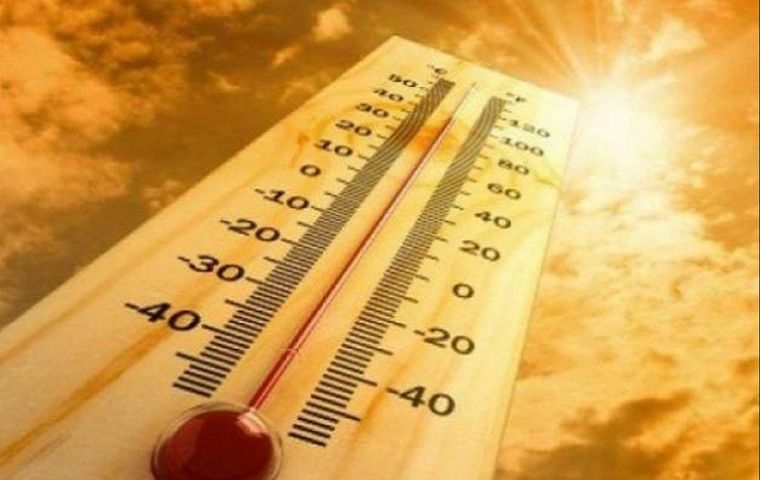MercoPress. South Atlantic News Agency
July 2019, the hottest on record, and Arctic ice shrank to its lowest, NOAA reports
 According to the NOAA, the average global temperature for the month was 0.95 degrees Celsius above the 20th century average of 15.8 degrees Celsius
According to the NOAA, the average global temperature for the month was 0.95 degrees Celsius above the 20th century average of 15.8 degrees Celsius  Searing heat waves saw records tumble across Europe last month, while in the US, nearly 150 million people struggled to stay cool
Searing heat waves saw records tumble across Europe last month, while in the US, nearly 150 million people struggled to stay cool  Alaska had its hottest July since it began keeping records in 2005, several countries in Europe saw their heat records smashed
Alaska had its hottest July since it began keeping records in 2005, several countries in Europe saw their heat records smashed July 2019 temperatures were the hottest ever recorded globally; the US National Oceanic and Atmospheric Administration (NOAA) said on Thursday, while satellite data showed polar ice shrank to its lowest levels.
According to the NOAA, the average global temperature for the month was 0.95 degrees Celsius above the 20th century average of 15.8 degrees Celsius, making it the hottest July in its records, which go back to 1880.
“Much of the planet sweltered in unprecedented heat in July, as temperatures soared to new heights in the hottest month ever recorded. The record warmth also shrank Arctic and Antarctic sea ice to historic lows,” the agency said.
The findings confirmed data released by the EU's Copernicus Climate Change Service on Aug 5, though the margin of the new record compared to the last, in July 2016, was greater according to the US data.
Searing heat waves saw records tumble across Europe last month, while in the US, nearly 150 million people struggled to stay cool from the Midwestern plains to the Atlantic coast and local media reported at least six deaths.
The new high is all the more notable because the previous followed a strong El Niño, which boosts average global temperate beyond the impact of global warming alone.
El Nino are naturally occurring weather events triggered by periodic warming - every three to seven years - in the eastern Pacific Ocean.
“Nine of the 10 hottest Julys have occurred since 2005 - with the last five years ranking as the five hottest,” the NOAA said, based on its data from weather stations, ship reports, and buoys.
Alaska had its hottest July since it began keeping records in 2005, several countries in Europe saw their heat records smashed, and it was also the hottest month ever across Africa as a whole.
There were some regions with cooler than average temperatures including parts of Scandinavia and western and eastern Russia, where temperatures were at least 1.5 degrees Celsius below average or cooler.
Average Arctic sea ice meanwhile set a record low for July, at 1.9 million sq km, 19.8% below average, and surpassing the previous historic low of July 2012.
Average Antarctic sea ice was 675,000 sq km, 4.3 per cent below the 1981-2010 average, making it the smallest for July in the 41-year record.




Top Comments
Disclaimer & comment rulesCommenting for this story is now closed.
If you have a Facebook account, become a fan and comment on our Facebook Page!